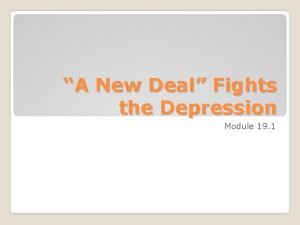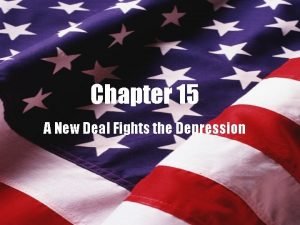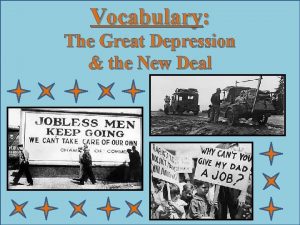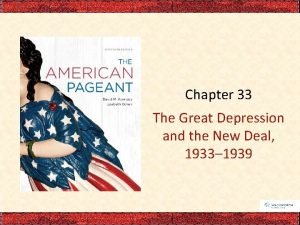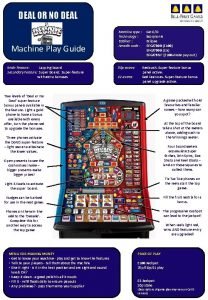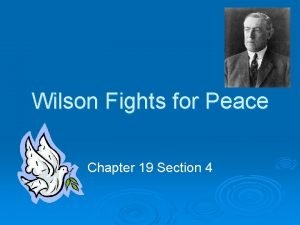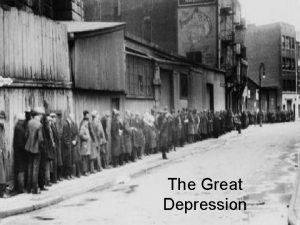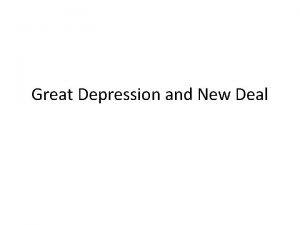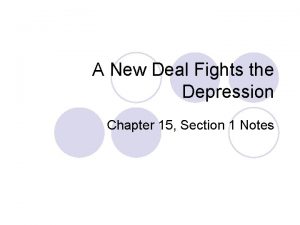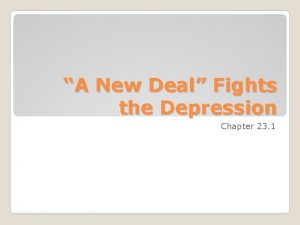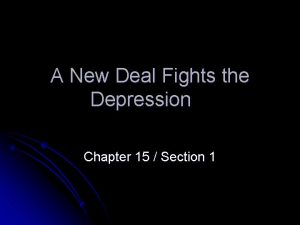NEW DEAL FIGHTS THE GREAT DEPRESSION Unit 5











- Slides: 11

NEW DEAL FIGHTS THE GREAT DEPRESSION Unit 5 Notes (pg. 5 – 6)

OBJECTIVES: President Franklin D. Roosevelt’s New Deal programs stimulate the economy and the arts. The Deal leaves a lasting, yet controversial mark on American government. Objectives: ØWhat was the New Deal? ØWhat did Roosevelt do during the Hundred Days? ØWhy were Roosevelt’s fireside chats significant?

1932 ELECTION Unlike the election of 1928, the 1932 presidential election showed that Americans were clearly ready for a change. The Depression had robbed people of work, food, and hope. o. The Republicans re-nominated President Hoover, but the recognized he had little chance to win. o. The Democrats nominated Franklin Delano Roosevelt, known popularly as FDR. He was a two-term governor and a distant cousin of former president Theodore Roosevelt. o. FDR had an overwhelming victory.

BRAIN TRUST After the election, but before he was inaugurated as president FDR forms the “Brain Trust, ” a group of professors, lawyers, and journalists to be his advisers and being formulating policies for his administration. o. This program, designed to alleviate the problems of the Great Depression, became known as the New Deal. o. The New Deal policies focused on three general goals: (1) relief for the needy, (2) economic recovery, and (3) financial reform.

HUNDRED DAYS Immediately after taking office, FDR’s administration launches a period of intense activity known as the Hundred Days Congress passes 15 major pieces of the New Deal legislation Roosevelt declares a bank holiday and closed all banks to prevent further withdrawals. He persuaded Congress to pass the Emergency Banking Relief Act. , which allows the Treasury department to inspect banks. Decides which are insolvent, sound, or need loans. Restores public confidence in banks because now customers had greater faith that the open banks were in good financial shape.

FIRE SIDE CHAT The day before the first banks were to reopen, FDR gave his first fireside chat. Radio talks about issues of public concern, explaining in clear, simple language his New Deal programs Look on page 443

FIX THE BANKS Congress took another step to reorganize the banking system by passing the Glass-Stegall Act – establishes the Federal Deposit Insurance Corporation (FDIC), which insures individual bank accounts and regulates banking practices. FDR and Congress also worked to regulate the stock market and passed the Federal Securities Act, which required companies to give all information on stocks and made them liable for any misrepresentations. Congress also passed the Securities and Exchange Commission to regulate the stock market and prevent companies from rigging the market for their own profit.

WE CAN DRINK AGAIN! Roosevelt also persuaded Congress to allow production of some alcoholic beverages. The goal was to raise government revenues by taxing alcohol. By the end of 1933, the Twenty-First Amendment had repealed prohibition. And the 18 th amendment which was passed in 1920!

ALPHABET SOUP Agricultural Adjustment Act (AAA) – raise crop prices by lowering production. The government achieved this goal by paying farmers to leave certain amount of land unseeded. The theory that the reduced supply would increase prices. The government provided work projects through programs like the Civilian Conservation Corps (CCC) which put young men to work. The National Industrial Recovery Act (NIRA) established many state standards, jobs, and projects. Establishes codes of fair practice for industries, set prices for many products, The Public Works Administration (PWA) was created to give money to states to create jobs; most jobs were to construct schools and other community buildings. The Civil Works Administration (CWA) provided over 4 million peoples with jobs to build schools and raise money for teacher salaries. Home Owners Loans Corporation (HOLC) gives loans to prevent foreclosures and the Federal Housing Administration (FHA) gives loans for mortgages and repairs. Federal Emergency Relief Administration (FERA) was direct relief for the needy. Helped furnished food and clothing to the unemployed, the aged, and the ill.

NEW DEAL CRITICISM By the end of the Hundred Days, millions of Americans had benefited from the New Deal programs, but the government did not. The government’s policy of deficit spending, spending more money than the government takes in to fund the New Deal, stimulated the economic recovery, but also put the government deeply in debt. Liberal critics argued the New Deal does not do enough to help the poor or fix the economy. Conservative critics argued that the government had too much control of business and would interfere with the workings of a free-market economy. In 1935, the Supreme Court was influenced and ruled the NIRA and AAA were unconstitutional and began to dismantle the New Deal. NIRA: gave legislative powers to the executive branch and the enforcement of industry codes within states went beyond the federal government’s constitutional powers. AAA: Agriculture is a local matter and should be regulated by the states rather than by the federal government.

SOME THREATS FDR proposes to enact a court reform bill known as the “court-packing bill”. Would reorganize federal judiciary and allow FDR to appoint six new Supreme Court justices Both Congress, and the press protest Doesn’t matter, in 1937 a justice retired, and FDR appoints a new liberal judge. Some conservatives opponents of FDR form the American liberty League because they think the measures violate respect for personal rights and property. Father Charles Coughlin wanted a guaranteed income and the banks to be nationalized Dr. Francis Townsend devises a pension plan for the elderly Most serious challenge to the New Deal came from Senator Huey Long, eager to win the presidency for himself he proposed a nationwide social program called Share-Our. Wealth. Under the banner slogan “Ever Man A King” he promised to provide a decent standard of living to all Americans by spreading nation’s wealth. At the height of his success, he was assassinated.
 A new deal fights the depression
A new deal fights the depression The new deal fights the depression
The new deal fights the depression Great depression and new deal vocabulary
Great depression and new deal vocabulary What is the main idea of this cartoon?
What is the main idea of this cartoon? Chapter 33 the great depression and the new deal
Chapter 33 the great depression and the new deal A great deal vs a great many
A great deal vs a great many Deal or no deal machine
Deal or no deal machine Rudolf vizental
Rudolf vizental Wilson fights for peace
Wilson fights for peace What is at the root of most arguments and many fights
What is at the root of most arguments and many fights How can anger and revenge lead to fights?
How can anger and revenge lead to fights? Shrek clip
Shrek clip
